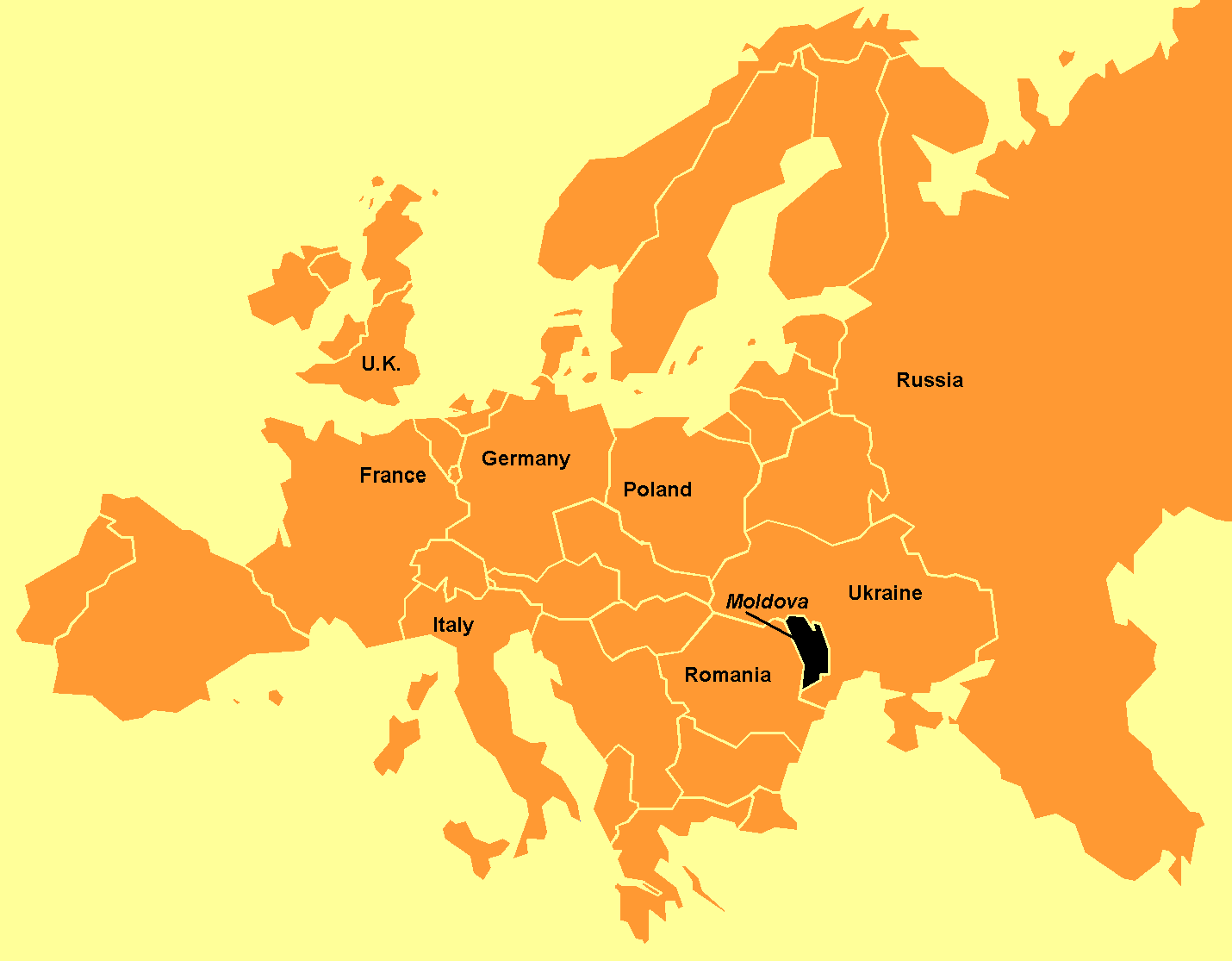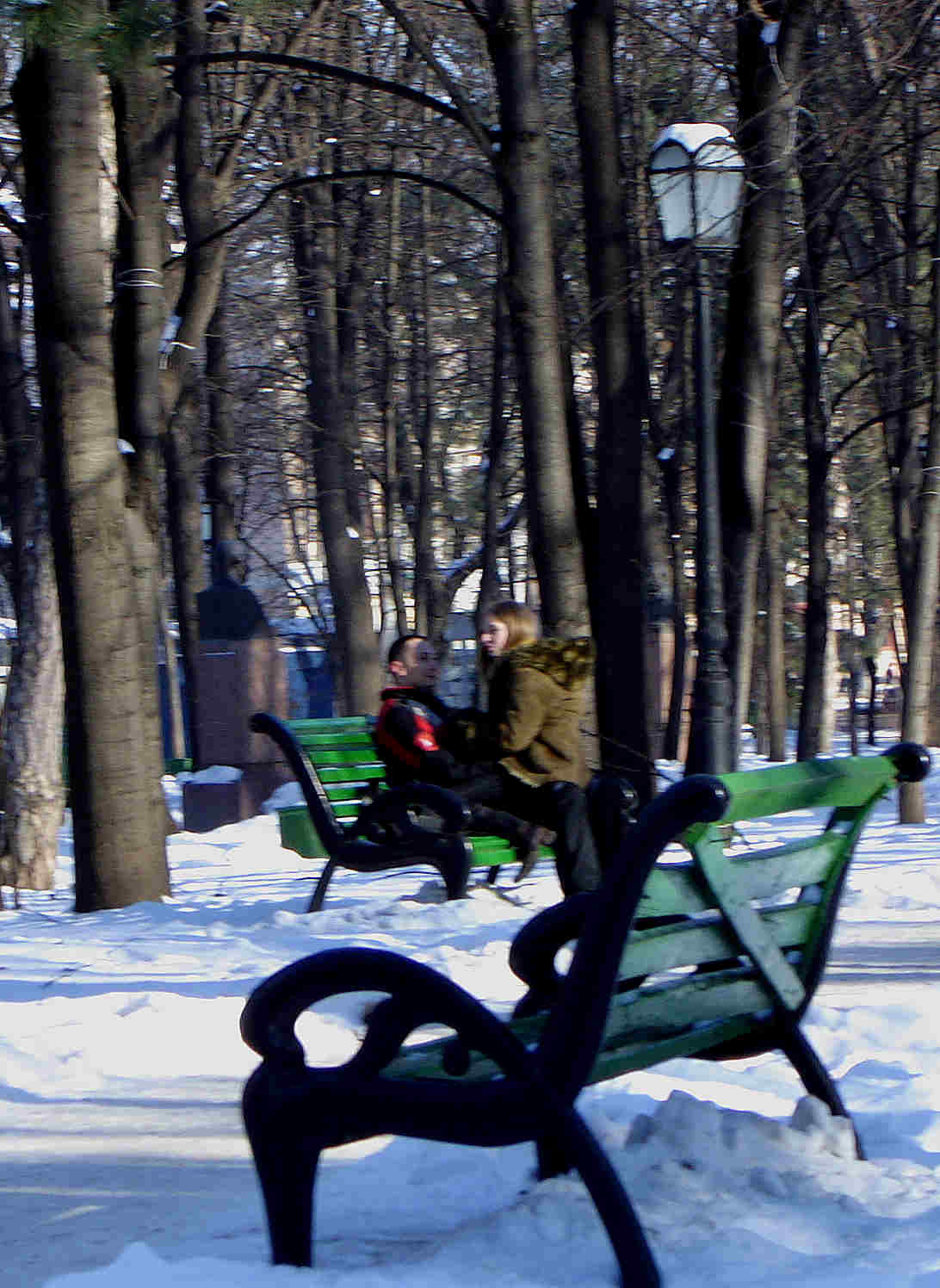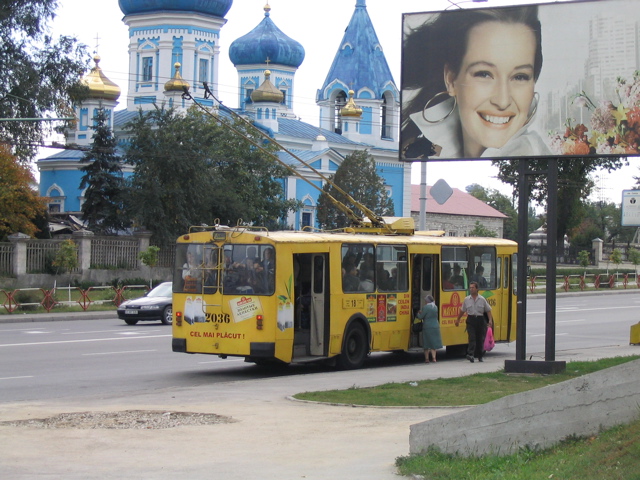| The Moldova Blog: |
 |
|
| Adventures of an American in Chisinau |
| Links to all of my on-line ramblings and other useful information. | My preparations to come to Moldova and my first impressions of it | More on Moldovan Economics, social realities, transportation | More on Communist architecture, Martisurs, and Int. Women's Day | Spring finally comes to Chisinau and I am making trips around the country. | The end of the semester and exams at the university. |
![]()
| 1/29 Courting...Moldovan style. With little
money and usually living at home until being married, dating presents
unique obstacles in Moldova. It is all a very tame
adventure by American standards. The couple strolls through a park
chatting, holding hands, usually smoking cigarettes; until they sit on a
park bench and begin "making-out." I must say that it
is all rather romantic even in the icy winter (I snapped a photo of an
unsuspecting couple). On Saturdays it is common to see brides
and grooms in the park all dressed up getting their wedding photos taken.
Maybe, it allows them to remember dating <grin>. The main park in the city is called Stefan cel Mare (1457-1504) after the king who held the Turks and others at bay in somewhere between 30 and 40 battles in the area. At this time there was a loose confederation of four principalities that spoke a common Latin-based language known as Rumanian. In the same general era of Stefan cel Mare was Vlad Tepes (also know as the "impaler"), whose particularly bloody and brutal punishment of the Turkish invaders eventually giving rise to the legend of Dracula. By 1600, the Turks had prevailed and dominated the area then known as Moldavia and brought it into the Ottoman Empire (as did Wallachia and Transylvania). Later, after a war between the Turks and the Russians, most of what was Moldavia became a part of Russia. After World War I, the area voted to become a part of Romania. In 1940, as part of the secret pact between Hitler and Stalin, about half of Moldova was ceded to the Soviet Union and became the the Moldovan Soviet Socialist Republic (MSSR). During World War II Moldova was occupied by the Nazis and later was liberated by the Soviets after almost all of Chisinau was decimated by bombing from the opposing air forces. In 1991, The MSSR became the Republic of Moldova--an independent state. You would have to go all the way back to the reign of Stefan cel Mare to have seen an independent state here! Trying to define Moldova in post-Soviet times has been difficult to say the least. About two-thirds of the country are ethnically Moldavian, almost all speaking a dialect of Romanian as their first language. About 15% of the country are of Russian origin or descent and speak Russian as their first language, another 15% are of Ukrainian decent and also tend to be Russian speakers. Added to this mix are some Turkish speakers in the Gauguz region and Bulgarians in the south. One of the more interesting facets of Soviet-ification of Moldova was to teach Moldovan children to write Romanian with the Cyrillic alphabet (like Russian) , though today the local language is written in the Latin alphabet. With all that complicated history, it makes me happy just to see people in love... |
 Gardina Publica Stefan cel Mare, Chisinau, 28 January 2006. Temperature: 20 degrees F.
Arc de Triumf and the Chisinau Cathedral |
![]()
|
31 August Street (well, sidewalk) on 26 January 2006.
The government building in Chisinau |
1/26 Yesterday was my first class meeting at ISPRI
and I have to say that I was impressed by the quality of the facilities,
the faculty, and the students. The students are very knowledgeable
about
the US and are quite inquisitive and critical--they will be fun to teach! Today, it warmed up to 18 degrees Fahrenheit so I took a long walk around Chisinau and took some pictures and had a cup of tea at a cafe under an upscale grocery store called Green Hills. The store was nicer than anything we have in Macon and in the lower floor was a clothing store with every sort of designer labels and a coffee shop tucked away in a corner. Well, as we all know, I have never been one to dress to impress--which makes me stand out like a sore thumb here. While I was in the very upscale store, I got to thinking about how everyone here wants to impress those around them--its important. Perhaps this is a legacy of so many years of not being able to make many choices. After class, yesterday, I talked with some of my students about how privileged they feel to be able to go to university. It is a point of pride because in the Communist days only a few slots were allowed and few of their parents could study. And even when they could go to university, the government decided what degrees they could pursue. The students are worried about what life will be like when they graduate because there are few jobs to go around. It amazes me that they all speak at least three languages fluently and are quite bright and they worry that instead of dynamic careers, they will wind up as maids in Italian hotels or working construction in Portugal. But their fears are, unfortunately, quite reasonable. A recent survey indicated that Moldovans are the least happy people on earth. Not surprising when the average wage is less than $100 U.S. per month. This is an educated and sophisticated population and their average standard of living has been nearly cut in half since the fall of the Soviet Union 15 years ago. This is worse than for people in the other former Soviet countries who have mostly seen their average standard of living bettered over these years. Sadly, Western European nations are not open to Moldovan immigration because they already have an influx of Eastern Europeans from EU member states. To compound matters, there are few natural resources here and no reliable domestic energy source (but they do have some very good wine). Let alone the fact that you can die just walking around the city (whether you slip on the ice or fall into a missing manhole cover)! Add on to those factors--high levels of corruption in government and a well developed trade in the trafficking of humans--you can understand why Moldovans might not be too happy. On the other hand, I find the people here to be very warm, open, and genuine--far happier than one might expect. One of my students calls Moldova the land of Paradox--out the mouths of babes... |
![]()
| 1/21 It is cold, very cold here the next few
days--the highs are just a few degrees above zero (well below freezing).
The temperature forecast for Monday is that the high will be 3 degrees
Fahrenheit ( a mere 29 degrees below freezing!!!). I must say,
however, that the city is beautiful in snow--especially when the sun comes
out. Seems that most of my focus so far has been on the weather and that may be
just due to being in an unusual environment. We can assume through
the rest of my posts that it is cold until something indicates the
contrary. It does amaze me how Soviet heat works--it is a system of
radiators that heat the whole city and is turned on and then later turned
off--no individual thermostats (though many apartments have now installed
an independent secondary heat source). I have made arrangements with both my universities to have a teaching schedule that starts next week. My appointment is with 2 universities here in Chisinau:
|
Sunday, 22 January 2006 from the balcony of my apartment in Chisinau. |
![]()
|
|
1/19 Last night we had an
official reception hosted by the Public Affairs section head for the
U.S. Embassy. Aleisha Woodward had about 30 people to her home
to welcome us (the three new Fulbright scholars) to Chisinau. As she
termed it, "I want you to meet cool young Moldovans and some heads of NGOs
that may be useful to you." I made a number of good contacts
including the head of the American Studies program at Moldova State
University and also the vice-chair of the service-learning program at
Moldova State. I am excited to better understand how
service-learning is conducted here and hopefully can make some contacts
that will have benefit for me at Mercer. Part of the goal of
the Fulbright program is to expose you to as many local as possible--so we
will be conducting workshops, giving lectures, participating in panels
across the city (in in our case across the country). When I left the
States, I was honestly wondering if I would have enough to do but now,
after just one week, I am wondering if I will be able to everything that I
want to do while I am here. I also had coffee with a fellow who lived in the states for five years and is now at university here in Chisinau. We talked about how government and politics work in Moldova as well as the university system where there are over 30 universities in Chisinau alone (do remember that before the fall of the Soviet Union, the literacy rate here exceeded 99%). One of the hallmarks of Moldova seems to be hospitality--folks go very much out of their way for you. Perhaps this is because relatively few foreigners come here--only about 70,000 per year. I am still meeting my contacts at the universities and trying to figure out the systems but everyone has been very helpful. This certainly has been the case of the staff at the embassy--they have been so helpful in getting us get settled and making local contacts. The warmth of the people here is a wonderful contrast to the cold of the icy sidewalks! P.S. It was snowing when I woke up and has been all morning. The temperature right now is 25 and it will be much colder for the next few days on Monday the high will be 8 degrees F. And I am not even going to start talking about the lows! |
|||||||||||
From
left to right:
|
![]()
| 1/18 I saw a man walking on water and it was me!
Sorry for the long time since I wrote. I have been getting settled.
Chisinau is delightful and I have already made my first presentations at
an American Studies workshop. I have had to to go the embassy
several times and each time I walk through the city, I wonder about Soviet
times (perhaps because the Soviet architecture is everywhere). I
think about growing up with all the perceptions of an American born in the
1960s and what the reality of life was really like in the Soviet Union
(not so good).
As for the walking on water, I can do it every day--as do thousands of Chisinauians (some in high heels). I am talking about the 1-3 inches of ice that cover most of the sidewalks and many of the roads. It is like a huge skating rink! I am fortunate because I brought something called Yak-Traks with me that fit on the soles of your shoes to give you traction. They work great! So maybe I need to quit thinking that it is a miracle. More to come... |
Winter in Chisinau 2006 |
![]()
 Chez Grant in Chisinau |
1/6 I found a really nice apartment (apartment in Romanian) in the center of town. Picture is to the right. I am afraid I was unable to get an old Soviet-style prefabricated bloc apartment. Alas, I must suffer through living a newly renovated place downtown with its own hot water and thermostat--will be difficult. Well, this is my last post from Macon...tomorrow its Atlanta-New York-Istanbul and then Istanbul-Chisinau. I should be back on-line with e-mail, etc within a week. |
![]()
| 12/22 In eagar anticipation of arrival in Chisinau, I redid the website and cleaned up some things...not much longer until I leave. Soon I will be passing through the "Gates of the City"--which are high rise apartment blocks (see picture at right). I realized today that I am expected to give a lecture when I arrive entitled: "How Domestic Politics in the United States Affects its Role as a Global Political Actor." I guess I ought to give it some thought. The next significant event (besides packing) is to secure a place to live in Chisinau. There are tons of choices--gone are the good old Soviet days when choice was something that you could only hope for. I have been told one luxury worth obtaining in my apartment is an independently controlled thermostat--in the old days when many of the buildings were built the city was on central heat--meaning that the heat was controlled centrally by the city and not the tenants of the apartment blocks. Also have an independent hot water heater is an advantage. Much to learn. I have to admit I face some anxiety about leaving home for so long but I think, all in all, it will be a great experience. |
 The City "Gates" a Soviet Urbanization program undertaken on the outskirts of the city. This the view of Chisinau as you come in from the airport. |
![]()
 Strada Ciuflea--picture by Dr. John Rager of Amherst College (former Fulbrighter). |
11/3 OK, time is getting short (oh, gosh what is the Romanian word for short--ah, yes scurt). I can't believe how time is flying and how much more I need to do to prepare for leaving. I need to pack books, buy supplies, and all sorts of other things. Ada has graciously agreed to continue my language tutoring over the Christmas break and I know I need it! I read yesterday that talks are underway to let the Transdneistria join Ukraine as a resolution to the 13 year old standoff. It will be interesting to see if the borders are still the same when I get there in January--but I am not holding my breath. At the left is a typical scene from a Chisinau street. |
![]()
| 9/19 With three and a half months to go, my Romanian is still weak but I have my plane ticket! A stopover in Istanbul would be nice and I am really hoping that Lee can go with me. He will be super valuable in getting my apartment set up and I can use most of his luggage allowance for the flight over (I wound up with about 200 lbs). I set up the blog today and borrowed some photos (with any luck I can start adding my own photos to the site in January). |
Chisinau Cathedral |
![]()
|
This page was first created on 09/19/05 by Prof. Chris Grant of Mercer University. Dr. Grant is an Assistant Professor in the Department of Political Science at Mercer University and is the Assistant Director of Service-Learning at the Mercer Center for Service-Learning and Community Development. The site was last updated on 05/04/06. You may e-mail Prof. Grant by clicking here or you may return to his homepage by clicking here. |